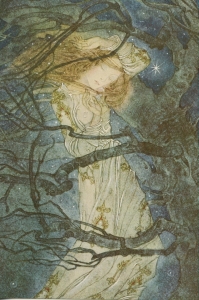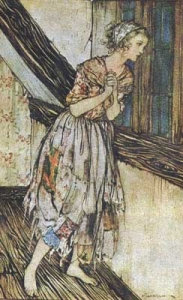What is Your Narrative Really About?
 Most writing instructors talk about the need to identify the theme—or the essence—of your piece. This is something you should be able to express in a short statement that slices straight into the heart of your narrative. Uncovering the theme, as they acknowledge, can be one of the more evasive challenges a writer faces. For some a theme emerges during the writing of a detailed outline and directs the work that follows, but for many it doesn’t appear until a later draft. However it may be revealed, theme is the electric current that runs through the whole piece. It becomes the guiding force behind your decisions about what stays in your draft and what bits and pieces–lovely though they may be–wind up in the recycling bin.
Most writing instructors talk about the need to identify the theme—or the essence—of your piece. This is something you should be able to express in a short statement that slices straight into the heart of your narrative. Uncovering the theme, as they acknowledge, can be one of the more evasive challenges a writer faces. For some a theme emerges during the writing of a detailed outline and directs the work that follows, but for many it doesn’t appear until a later draft. However it may be revealed, theme is the electric current that runs through the whole piece. It becomes the guiding force behind your decisions about what stays in your draft and what bits and pieces–lovely though they may be–wind up in the recycling bin.
Annette and I have found various means to describe this elusive concept to our students. A look at what it is not sometimes helps. It’s not the plot (the escalating sequence of interconnected events). It’s not the thumbnail sketch, or premise. And it’s not a value or moral the writer overtly states, though its message underlies everything, from the first paragraph onward.
Probing questions to ask of your piece can be illuminating, like Annette’s query: What’s the story really about?
There are other ways to get to the core. In an article for Writer’s Digest magazine last fall K.M. Weiland looks for the “dramatic question” that drives the Victorian classic Jane Eyre. He proposes the question is: Am I Servant? A dramatic question can be answered with a yes, no or maybe. And, as in this case, it’s the force that harries the protagonist, from the point in her privileged childhood when she is orphaned and becomes an underling, to her discovery of her innate inner strength. Nowhere does Bronte overtly state her subject’s dramatic question, but it’s alluded to from the first paragraph onward.
Sometimes we divert our students with a bit of storytelling to move from the abstract to the concrete with a cameo version of Dickens’s Christmas Carol or the Grimms brothers’ Cinderella. The latter is such a well-known classic, retold in Disney’s recent film, that the theme and the dramatic question are clear. Our students suggest themes such as: hope prevails; good overcomes evil; or pure of heart will be rewarded. The dramatic question, our students say, is similar to Jane Eyre, which is perhaps not a coincidence.
Pose these questions of one of your favourite stories, to see what’s at its core. Then push your own writing to reveal its hidden messages, which will guide the structure of your ongoing work and help you achieve a piece that has universal appeal.
P.S. The new version of Cinderella, in my opinion, lacks the nuance and magic of the 1950s animation — by a long shot!

